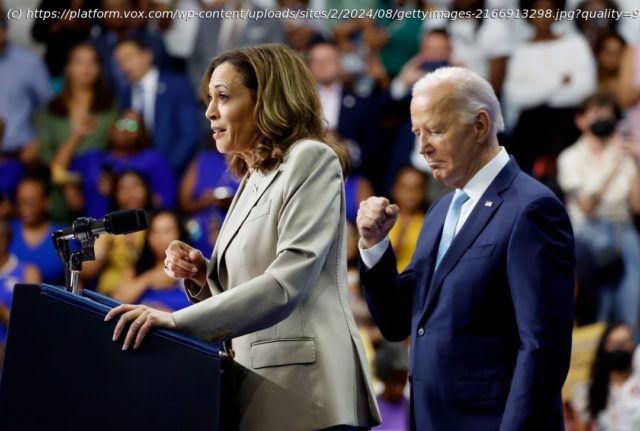President Biden had a proven argument against Trump that Vice President Harris isn’t using enough.
President Joe Biden bet his reelection bid on the idea that American voters in November would care about the fate of American democracy. The conventional wisdom now is that Biden was wrong and that Vice President Kamala Harris is not only stepping away from his strategy but doing so for good reasons.
Many Democratic political types today believe that “democracy” is a message that’s both tired and abstract, something that preoccupies elites but not the key voting demographics. They cite data showing ”democracy” at the bottom of the list of voter concerns in the 2024 election, with issues like inflation, immigration, and abortion placing well ahead of what Joe Biden treated as issue number one.
It appears Harris has taken the conventional wisdom to heart. Reporting in Axios and the shows that Harris uses the word “democracy” far less than Biden did in both advertising and stump speeches — mentioning it only 12 times in her first nine campaign rallies.
Rather than casting the Trump-Vance ticket as a threat to democracy, the Harris-Walz campaign prefers to describe them as “weird” men aiming to curtail Americans’ freedom. The language of freedom has suffused the Democratic National Convention so far, and will almost certainly be a centerpiece of Harris’s address on Thursday night.
Yet I think the conventional wisdom is wrong in nearly every respect. Harris should not abandon democracy as a campaign issue, but rather double down on it.
Democracy is a more powerful issue than polling might suggest: It likely swung the 2022 midterms Democrats’ way, and some research suggests it remains potent in 2024. Democracy messaging is especially persuasive with moderate Trump-skeptical Republicans, an important voting bloc in swing states around the country. Given its proven track record of success with a critical demographic, democracy ought to be a significant part of Harris’s message.
Integrating democracy doesn’t require ditching the clearly effective freedom messaging: Harris can quite easily spend more time highlighting attacks on democratic freedoms, talking about “the freedom to vote” as one of several essential liberties Trump and Project 2025 plan to attack. That’s what some of the Democratic pollsters who helped develop the party’s “freedom” message back in 2022 currently urge her to do.
“Saying ‘we’re trying to protect your freedom to vote’ and ‘we’re trying to protect your freedom to have a family when you want to’. those two things together frame that story in a way that makes people care about democracy,” Jen Fernandez Ancona, vice president of the progressive strategy group Way To Win, told Vox.
If Harris listens to the conventional wisdom instead, she’ll be leaving a powerful campaign issue — and potentially some crucial votes — on the table.The case that democracy matters in American politics
Sarah Longwell is a longtime Republican strategist who, since 2016, has made it her life’s work to figure out how to get her fellow conservatives to ditch the Republican Party. As the head of a group called Republican Voters Against Trump, she has conducted “hundreds and hundreds” of focus groups with persuadable Republican moderates — a systematic attempt to figure out how they might be convinced to ditch the Trumpified GOP.
When she talks to former Trump voters, they say the same thing over and over again: that his assault on democracy pushed them out of the party.
“I listen to why voters who voted for Trump now refuse to do so, and the No. 1 reason is that January 6 was a red line for them. They were out after that,” Longwell says.
The 2022 midterms showed that these voters mattered — that these voters aren’t just important, but potentially decisive in critical states.
We remember 2022 as a Democratic victory because the party managed to make gains in the Senate while suffering minimal losses in the House — defying the historical rule that the party in charge of the White House loses in the midterms. But this wasn’t the result of a blue wave: Republicans got several million more votes in House races nationally than Democrats. What happened instead is that Democrats excelled in a handful of key races, making history as a result.
So what happened in those key races? The Dobbs ruling was a major part of the story. But so too was democracy.
Multiple separate data analyses, conducted by sources ranging from Stanford political scientists to the Democratic data firm Catalist, attempted to estimate a “MAGA penalty”: how much Republicans who parroted Trump’s “big lie” about 2020 suffered at the ballot box relative to other Republicans. On the whole, these estimates converge somewhere in the neighborhood of a two- to three-point penalty for MAGA candidates, with some estimates going as high as five or six.






